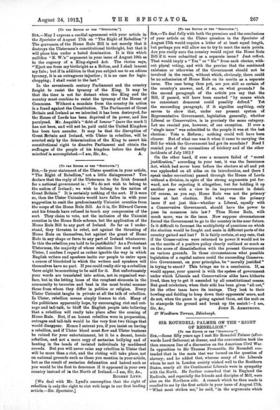[To TER EDITOR OF THE " STRDTATOR.".1 Sra,—To deal fully
with both the premises and the conclusions of your article on the Ulster question in the Spectator of August 17th would require a letter of at least equal length, but perhaps you will allow me to try to meet the main points. Are you really sure the country would reject the Home Rule Bill if it were submitted as a separate issue P Just reflect. That would imply a " Yes " or " No " from each elector, with- out plural voting, and with the proviso that the continued existence or otherwise of the Government should not be involved in the result, without which, obviously, there could be no submission of Home Rule on its merits as a separate issue. The case being thus put, are you still so certain of the country's answer, and, if so, on what grounds P In the second paragraph of the article you say that the Bill, if passed, will have been enacted " by means which no consistent democrat could possibly defend." Yet the succeeding paragraph, if it signifies anything, only serves to show that, under our present system of Representative Government, legislation generally, whether Liberal or Conservative, is in precisely the same category. Let me remind you, however, of one exception. If ever a "single issue" was submitted to the people it was at the last election : Veto v. Reform ; nothing could well have been clearer. But of what use was it when it came to carrying the Bill for which the Government had got its mandate P Need I remind you of the accusations of trickery and of the other incidents of July 1911 ?
On the other band, if ever a measure failed of " moral justification," according to your test, it was the Insurance Act, which had never been before the electors at all and yet was applauded on all sides on its introduction, and (here I speak under correction) passed through the House of Lords without a division, in spite of the strong arguments put for- ward, not for rejecting it altogether, but for holding it up another year with a view to its improvement in detaiL Of course, as you say, Home Rule was not the primary' issue at last election. But what was the primary issue if not just this—whether a Liberal, equally with a Conservative Government, should have the power to pass its measures into law P Thus Home Rule, with much more, was in the issue. Now suppose circumstances forced the Government to go to the country in the near future. Is it difficult to forecast the multiplicity of questions on which the election would be fought and seats in different parts of the country gained and lost P It is fairly certain, at any rate, that if the Conservatives were returned to power it would not be on the merits of a positive policy clearly outlined so much as on the score of dissatisfaction with the present Government on various grounds. In those circumstances what possible legislation of a capital nature could the succeeding Conserva- tive Government, on your principles, be "morally justified' in trying to enact ? This brings me to a conclusion. If, as would appear, your quarrel is with the system of government under which Liberals and Conservatives alike have hitherto lived, then try to get it amended by all constitutional means. But good cricketers, when their side has been given "all out," let the other team have its innings. They look to their bowling and fielding to keep down their opponents' score, and do not when the game is going against them, set the mob on to stampede the ground and break up the match !—I am, Sir, &c., JOHN R. .A.RaiSTRONG. 37 Woodburn Terrace, Edinburgh.


































 Previous page
Previous page